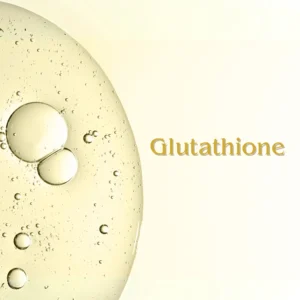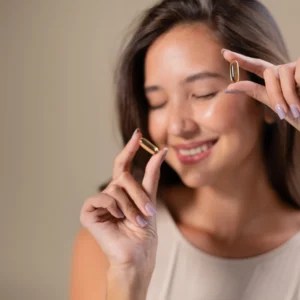Glutathione has quickly become a buzzword in the world of wellness. You’ll see it in skincare, supplements, IV drips—even beauty clinics. From brightening skin to boosting energy, it’s often called a “miracle antioxidant.” And honestly, the hype is hard to ignore.
But here’s the thing: while many people rave about the short-term glow, a growing number are asking a more important question—is it actually safe to take long-term? That’s a smart question to ask. After all, supplements aren’t just trends—they’re part of your health. So, let’s take a closer look at what science says and what your body needs to know.
Highlights:
- Glutathione is a powerful antioxidant naturally produced by the body, known for supporting skin clarity, liver detox, and immune health—though modern lifestyles often reduce its levels, leading many to supplement.
- Research shows it’s generally safe for long-term use at appropriate doses, with potential benefits like anti-aging, reduced inflammation, and improved brain, heart, and liver health—but more studies are still needed.
- To use it wisely, choose quality supplements, stick to recommended doses, support it with a healthy lifestyle, and consult a doctor—especially for long-term or medical use.
Table of Contents
Why Is Everyone Talking About Glutathione?

Photo is from Canva Stock Images
Glutathione is like your body’s built-in bodyguard. It’s a powerful antioxidant made from three amino acids—cysteine, glutamate, and glycine—and it’s found in every single cell. Its job? Protecting you from damage caused by toxins, stress, pollution, and even junk food. It also helps repair cells, boost immunity, and support liver detox—basically keeping your system clean and running smoothly.
But here’s the catch: things like aging, poor sleep, bad diet, and illness can drain your natural glutathione levels. Ever feel sluggish after a stressful week or late nights? Your glutathione likely took a hit.
That’s why many people turn to supplements—to give their body a helping hand when life gets busy or when they want clearer skin, better energy, or liver support. So while your body makes it, a modern lifestyle often means you need a little backup.
6 Reasons Why People Take It?
People take glutathione supplements for many reasons, including:

Photo is from Canva Stock Images
- Skin brightening and anti-aging – Many users seek clearer, brighter skin and a more even complexion.
- Liver support and detoxification – Glutathione helps flush out toxins and supports overall liver health.
- Immune system boost – It strengthens the body’s defenses, especially during times of stress or illness.
- Support for chronic conditions – Used in medical settings for managing diseases like Parkinson’s, fatty liver, and HIV.
- General wellness and energy – Users often report feeling more energetic and recovering faster from fatigue.
- Variety of forms for convenience – Available as capsules, powders, drinks, liposomal formulas, and even IV drips.
What Research Says About Long-Term Use
This is where things get interesting. Most studies on glutathione focus on short-term use. These usually last a few weeks or months. So far, results show that it’s generally safe and well-tolerated, especially at standard doses.
However, long-term studies, those lasting a year or more, are still limited. That doesn’t mean it’s dangerous. It just means we need more research to say for sure.
One promising fact is that in studies involving people with chronic conditions, glutathione has been taken for extended periods without serious side effects. Still, more trials in healthy individuals would give a clearer picture.
Are There Any Long-Term Benefits?

Photo is from Canva Stock Images
While research is still ongoing, early findings suggest several promising long-term benefits of glutathione—especially when taken consistently and combined with a healthy lifestyle. Here’s a quick look at what science is uncovering:
| Potential Long-Term Benefit | How Glutathione May Help |
| Anti-aging and skin health | Reduces oxidative stress, which may help slow down signs of aging and support skin clarity. |
| Inflammation reduction | Helps lower chronic inflammation linked to many diseases. |
| Liver detoxification support | Assists in flushing out toxins and protecting liver cells from damage. |
| Immune system protection | Strengthens immune function, especially during aging or illness. |
| Cognitive and brain health | May protect brain cells and support neurological function as you age. |
| Insulin resistance | Early studies show potential in improving insulin sensitivity. |
| Heart health | Antioxidant action may reduce risk factors linked to heart disease. |
| Support for neurological disorders | Being explored as a complementary approach for conditions like Parkinson’s. |
Any Side Effects to Watch Out For?
Generally, glutathione is well-tolerated. Some people may experience mild side effects like bloating, cramps, or skin rashes. These usually go away on their own.
One thing to note: long-term, high doses of glutathione may lower zinc levels in the body. Zinc is essential for immune health, wound healing, and many other functions. So it’s something to watch, especially if you’re taking it daily for months on end.
People with asthma or sulfur sensitivity may also need to be cautious. In rare cases, glutathione has triggered asthma symptoms when inhaled. Oral supplements seem to be safer in this regard.
Who Should Be Extra Careful?
If you’re pregnant, breastfeeding, or dealing with a medical condition, always speak with your doctor before starting any supplement—especially long-term.
The same goes for people taking chemotherapy or medications that may interact with glutathione. Since it affects how your body detoxifies, it could alter how some drugs work.
A quick chat with your doctor can save you a lot of trouble down the road.
How to Take It Safely
If you decide to take glutathione long-term, keep a few tips in mind:
- Stick to recommended doses – Don’t assume more is better.
- Choose high-quality brands – Look for products tested for purity and potency.
- Support it naturally – A healthy diet, exercise, and good sleep all help boost your body’s natural glutathione production.
- Consider cycling – Taking breaks between supplementing can give your body time to reset.
- Check in regularly – Talk with your healthcare provider about any changes or side effects you notice.
What Health Authorities Say
Glutathione is approved as a supplement, not a drug. That means it’s not regulated as strictly as medications.
So far, agencies like the FDA and WHO haven’t issued warnings against it. But they also haven’t officially endorsed it for long-term use. This is why it’s so important to be a smart consumer and stay informed.
Final Thoughts: So, Is It Safe Long-Term?

Photo is from Canva Stock Images
All things considered, glutathione appears to be safe when taken at the right dose. Many people have used it for months—or even years—without problems. That’s encouraging. But let’s be honest: no supplement is a magic cure-all.
The real key is balance. Glutathione works best when combined with a healthy lifestyle—good sleep, clean food, and daily movement. Also, listen to your body. And don’t skip that chat with your doctor, especially if you plan to take it regularly.
Science is still unfolding, but so far, things look promising. Stay smart, stay curious, and use glutathione wisely.
Frequently Asked Questions (FAQs)
Can I take glutathione every day?
Yes, you can. Many people take glutathione daily, especially for skin health or immune support. Just make sure you stick to the recommended dose and talk to your doctor if you’re unsure.
How long can I safely take glutathione?
There’s no official limit, but studies suggest it’s safe for long-term use when taken properly. However, it’s always best to take breaks or check in with your doctor if you’re using it for several months.
Can men take glutathione too?
Absolutely! Glutathione isn’t just for women. Men can benefit from its antioxidant, detox, and immune-supporting effects just the same.
Will I stop producing natural glutathione if I take supplements?
So far, there’s no strong evidence that taking supplements shuts down your body’s natural production. Still, moderation is key, and supporting your body through a healthy lifestyle is just as important.
Is oral glutathione effective, or do I need IV drips?
Oral glutathione can be effective, especially when taken in liposomal form or combined with Vitamin C. IV drips deliver it faster, but they’re not always necessary unless prescribed for medical reasons.





